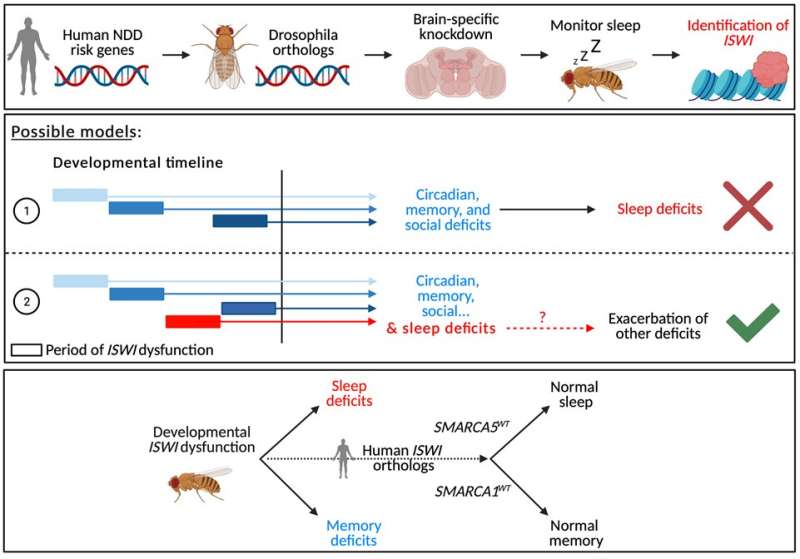#High-risk gene for neurodevelopmental disorders linked to sleep problems in flies

“#High-risk gene for neurodevelopmental disorders linked to sleep problems in flies”

The mutation of a gene that has been associated with neurodevelopmental disorders like autism spectrum disorder led to marked sleep disturbances in fruit flies, according to a new study from scientists in the Perelman School of Medicine at the University of Pennsylvania. The findings, published Wednesday in Science Advances, provide further evidence that sleep is linked to early neurodevelopmental processes and could guide future treatments for patients.
While sleep disruption is a commonly reported symptom across neurodevelopmental disorders, including autism, it is often treated clinically as a “secondary effect” of other cognitive or behavioral problems, according to senior author Matthew Kayser, MD, Ph.D., an assistant professor of Psychiatry and Neuroscience at Penn, who led the study with Natalie Gong and Leela Chakravarti Dilley, both MD/Ph.D. students.
“Our paper shows that sleep problems are not arising because of these other issues, but rather, this gene acts in different brain circuits, at different periods of time during development, to independently give rise to each of these symptoms,” Kayser said. “Which is to say, we’re guessing that the genetic constellation or signaling pathway that leads to disorders like autism or depression can also lead to sleep problems in humans.”
To identify a correlation between sleep and neurodevelopment, Kayser and his research team genetically manipulated Drosophila, or fruit flies, by individually “knocking down” each of 218 genes that have been strongly associated with risk for neurodevelopmental disorders in humans. They then observed how the flies—a remarkably powerful model for biomedical research—reacted.
After observing the flies’ behavioral patterns, they saw that knocking down the gene Imitation SWItch/SNF (ISWI) made the fruit flies almost entirely unable to sleep. ISWI in fruit flies is homologous to SMARCA1 and SMARCA5 genes in humans that have been linked to various neurodevelopmental disorders. In addition to sleep deficits, the researchers found that knocking down ISWI also led to memory problems and social dysfunction. Surprisingly, the ISWI gene was found to act in different cells of the fly brain during distinct developmental times to independently affect each of these behaviors.
Importantly, even though sleep deficits appear to arise directly from dysfunction of a given gene, Kayser said that previous research suggests treatments like cognitive behavioral therapy for insomnia are still likely to be effective.
“Even if problems like sleep disruption or insomnia arise from really early problems in the brain’s wiring, we have every reason to believe that we can use existing treatments,” Kayser said.
The findings support the idea that treating sleep problems in children with neurodevelopmental disorders could potentially improve other symptoms. Future work will examine the potential for leveraging sleep as a modifiable risk factor in mitigating the severity of neurodevelopmental disorders.
“Now that we know that sleep deficits are a primary characteristic of early developmental origin in neurodevelopmental disorders, we can start to ask,” Kayser said, “whether improving sleep will also improve memory and social function.”
Sleep disorders: Patients often underestimate their total sleep time
N.N. Gong el al., “The chromatin remodeler ISWI acts during Drosophila development to regulate adult sleep,” Science Advances (2021). advances.sciencemag.org/lookup … .1126/sciadv.abe2597
Citation:
High-risk gene for neurodevelopmental disorders linked to sleep problems in flies (2021, February 17)
retrieved 17 February 2021
from https://medicalxpress.com/news/2021-02-high-risk-gene-neurodevelopmental-disorders-linked.html
This document is subject to copyright. Apart from any fair dealing for the purpose of private study or research, no
part may be reproduced without the written permission. The content is provided for information purposes only.
If you liked the article, do not forget to share it with your friends. Follow us on Google News too, click on the star and choose us from your favorites.
For forums sites go to Forum.BuradaBiliyorum.Com
If you want to read more Like this articles, you can visit our Science category.



